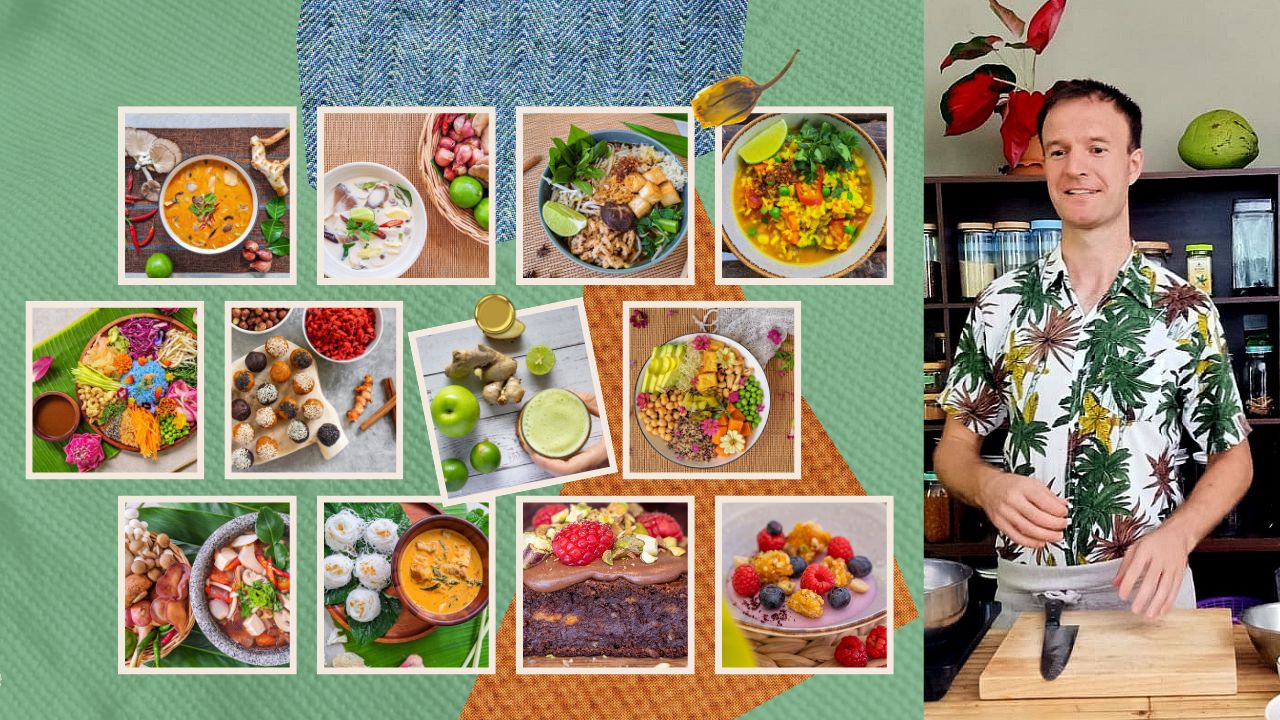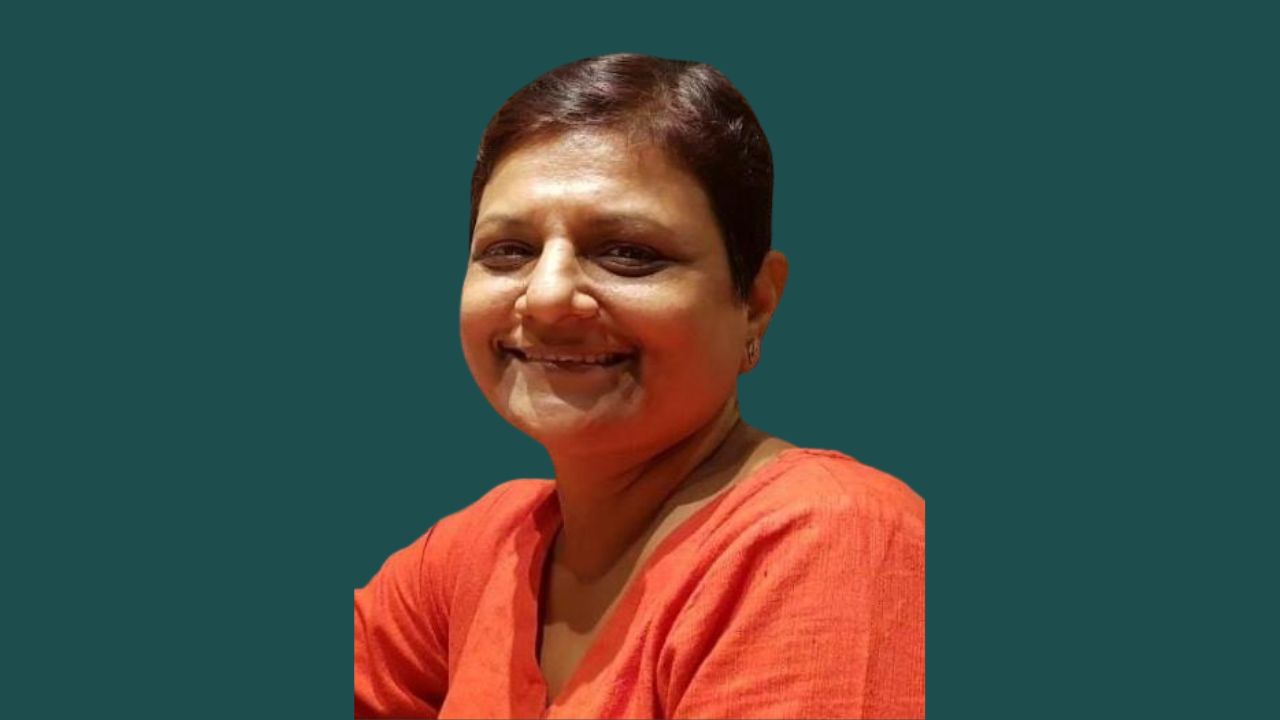This first thing you notice about Thailand-based Chef Jamie Raftery (The Holistic Chef) is just how happy he is. The importance of food and nutrition is pivotal in yoga and any spiritual practice and a vegetarian diet is always recommended. It brings a certain lightness to the body and this lightness of being is evident in all of Jamie’s words and actions. His compassion for animals inspired this Michelin-level chef to change his eating and cooking to a plant-based diet and this transformation of diet led to an inner transformation and even changed his life. Read on to find out more…
Sophia: It’s remarkable how your ethos about food changed after you lived in Thailand and went from a non-vegetarian diet to one that’s plant-based. Tell us about what shifted inside you?
Chef Jamie: It was a shift of consciousness that I was not expecting! I started to see food and feel its effects in a different way. We get energy from the food we consume. Eating animals (and their by-products) that have lived a life of suffering is going to have a certain effect on our gut microbiome and physical — mental energy. Eating a diet of predominantly unprocessed wholefoods is going to have a completely different impact on our physical and mental health. It’s hard to describe the feeling and shift of consciousness, but once you feel it, it’s hard to go back to eating animals. We get pleasure and sustenance from food everyday. I could not honestly enjoy or take pleasure in eating if I knew that the animal I was eating was subjected to such suffering and then there is the environmental impact.
Sophia: You spoke about how your understanding of flavour moved from presentation and flavour to nutrition and holistic. Tell us about that?
Chef Jamie: I worked in Michelin star restaurants for most of my career. Guests dining in such restaurants have high expectations and it’s a very competitive industry where you’re only as good as the last meal you served. Presentation and flavour are of course a priority and so much emphasis is placed on these ‘desire fulfillers.’ Health and nutrition was never really a pillar or core focus in Michelin star ‘special occasion’ restaurants where 20-course menus, wine flights, foie gras, caviar, wagyu, truffles and all the so-called luxury ingredients were shown off.
After over a decade cooking in Michelin star restaurants, I started to question ‘why I’m cooking what I’m cooking’ ‘What is the point of it all?!’
I had my own physical and mental health issues after a burn-out from over working. I healed myself through eating healthy whole foods and regular exercise. Throughout this rehabilitation time my core values and perspective around food and what I cooked started to evolve to placing ‘nutrition & health’ as my core holistic pillar.

Sophia: In spiritual practices, a vegetarian diet is recommended as food affects our gross and subtle bodies? Did you feel a change in your mental and emotional personality when you adopted a plant-based diet?
Chef Jamie: Absolutely! As I mentioned earlier, it’s hard to explain the feeling. It’s life changing and life enhancing.
Sophia: With globalisation, food is no longer a restricted commodity. For example, we can now get grains like quinoa all the way in India and similarly, food that was indigenous to a region is no longer restricted to that region. What do you think of this in terms of seasonality and freshness of food?
Chef Jamie: Like everything, there are pros and cons to this! Of course, you cannot beat fresh, local and seasonal produce. I always champion this way of cooking and eating. It supports your local grower, it’s fresher, it’s more cost-effective, air miles are reduced and eating the foods that are grown in your region will provide you with specific nutrients your body needs at that time of year.
When it comes to dried foods such as grains, pulses, legumes, nuts, seeds, and spices — these foods have been traded internationally as far back as history has recorded. The main reason the Spanish, British, Portuguese and many other nations sailed to foreign lands was for their foods and natural resources.
The problem with this food globalisation is the unfair distribution and food waste.
On one hand; the Teff farmer in Ethiopia or rice farmer in Thailand who grows food for export has a livelihood to sustain their family but are they getting a fair price for their hard labour? Absolutely not. For the most part, it’s the corporate co-op’s who buy the crops from the farmers at a very low price and then export at a premium price. These middle men are making big margins from exporting foods, while many people in these countries are starving.
Having Thai jasmine rice or Ethiopian Teff available around the world is a great luxury, but we need to provide the growers and their surrounding communities a fair price and also make sure these countries have enough food for their own people before exporting it to the West who actually waste so much food and overeat to the point of obesity.
I believe the people who grow, nurture, harvest and prepare our food have to be given more respect and a fair price for their labour of love that sustains us as a species. The knowledge of growing food is a gift that has been passed down through generations. Each region in the world has different challenges and opportunities for growing food. This knowledge is becoming lost as small farmers and growers go out of business in place of big-agriculture mono-crop industries that are decimating the soil and indigenous heirloom crops.
The global food system needs a major reform. It’s not an easy solution. According to UN reports 735 million people do not have enough food to eat everyday.
We can all play a part by making more conscious decisions on what to buy and what to eat. By just eating enough, not too much and not wasting food. We vote with our forks and knives everyday!
Sophia: Who are some of your culinary inspirations?
Chef Jamie: Rasmus Kofoed - Geranium, Copenhagen
Daniel Humm - Eleven Madison Park, NYC
Both are masters of their culinary art, inspiring a generation of chefs and doing monumental work supporting local growers. I had the good fortune to work as an intern in both of these chefs' kitchens.
Thomas Keller, Gordon Ramsay and Michael Caines were my inspiring culinary mentors throughout my career to-date
Sophia: Your favourite cook books?
Chef Jamie: The French Laundry cookbook. The most influential of my early career. I cannot keep up with the volume of cookbooks released! There are so many great cook books out there! I like to find recipes online and follow recipe bloggers or buy e-books.
Sophia: What would be your advice to people who want to pursue a career in plant-based cooking and nutrition?
Chef Jamie: Go for it.
- Learn something new everyday.
- Make connections and collaborate.
- Try new things.
- Explore new cultures.
- Travel.
- Have fun.
- Think outside the box.
- Make mistakes.
- Practise what you preach (but don't preach!)
- Lead by example.
- Be creative and build a business that is win-win-win. Good for you, good for the environment, good for the health of those who eat your food.
- Pace yourself.
- Have patience.
- Invest in yourself — you are the priority. The better you take care of yourself, the better you can inspire and look after others.
- Enjoy the journey
For further information visit The Holistic Chef





